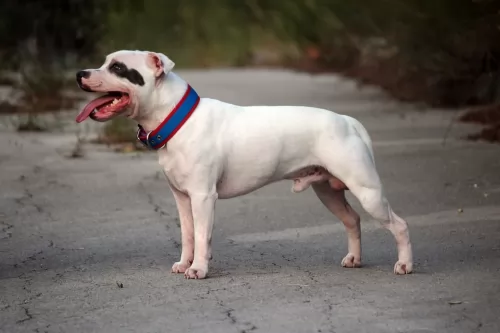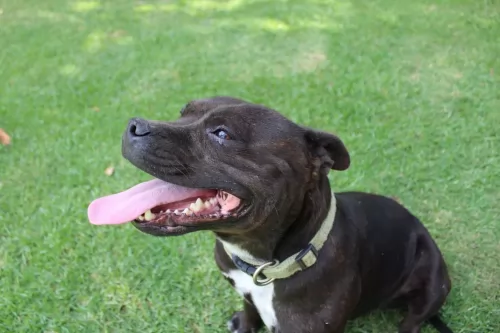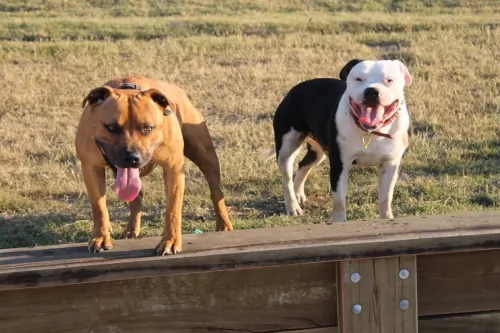 Petzlover
Petzlover Both Russell Terrier and Staffordshire Bull Terrier are originated from United Kingdom. Russell Terrier may grow 6 cm / 2 inches shorter than Staffordshire Bull Terrier. Both Russell Terrier and Staffordshire Bull Terrier are having almost same weight. Both Russell Terrier and Staffordshire Bull Terrier has almost same life span. Both Russell Terrier and Staffordshire Bull Terrier has almost same litter size. Both Russell Terrier and Staffordshire Bull Terrier requires Low Maintenance.
Both Russell Terrier and Staffordshire Bull Terrier are originated from United Kingdom. Russell Terrier may grow 6 cm / 2 inches shorter than Staffordshire Bull Terrier. Both Russell Terrier and Staffordshire Bull Terrier are having almost same weight. Both Russell Terrier and Staffordshire Bull Terrier has almost same life span. Both Russell Terrier and Staffordshire Bull Terrier has almost same litter size. Both Russell Terrier and Staffordshire Bull Terrier requires Low Maintenance.
 This feisty little dog was developed in England a couple of centuries ago. He has a well documented history. An interesting aspect with this dog is that the very name ‘Jack Russell’ became a common name for predominantly white terriers after the death of clergyman Jack Russell.
This feisty little dog was developed in England a couple of centuries ago. He has a well documented history. An interesting aspect with this dog is that the very name ‘Jack Russell’ became a common name for predominantly white terriers after the death of clergyman Jack Russell.
The Russell Terrier was developed from Jack Russell working terrier strains that were used in the 19th century for hunting fox. The dog has been standardized by Kennel Club recognition. The Fedédération Cynologique Internationale also recognizes the breed.
It was in the early 1970s that the Jack Russell Terrier Club of Great Britain was formed.
 The Staffordshire Bull Terrier was first developed in the northern sections of Birmingham and in Staffordshire, England. The Staffie is a cross between a Black and Tan Terrie and the Bulldog, but had other breeds crossed in over time in order to create a bull-baiting dog and a fighting dog. In the Victorian age these sports were banned but dog fighting went underground and continues on some level today.
The Staffordshire Bull Terrier was first developed in the northern sections of Birmingham and in Staffordshire, England. The Staffie is a cross between a Black and Tan Terrie and the Bulldog, but had other breeds crossed in over time in order to create a bull-baiting dog and a fighting dog. In the Victorian age these sports were banned but dog fighting went underground and continues on some level today.
The Staffordshire Bull Terrier was exceptional at these “sports” due to his build, power and jaw strength. Today’s Staffie is a descendent of those early Bull Terrier crosses. Together with the Bull Terrier and the American Pit Bull, the Staffie also traces its roots back to those original English Bully dogs. All three breeds have the Bulldog in common.
After dog fighting and bull baiting were banned the Stafforshire Bull Terrier was further developed as a companion and pet. Still their reputation as fighting dogs cost them recognition in the official kennel clubs for some time. They finally made the UK registry in 1935, but it was not until 1974 that the American Kennel Club (AKC) accepted them.
 The Russell Terrier has a weatherproof coat that is mainly white with patches of tan or black or maybe even both. You get the smooth haired type, the broken type- as well as the rough haired Russell Terrier. All these coats shed.
The Russell Terrier has a weatherproof coat that is mainly white with patches of tan or black or maybe even both. You get the smooth haired type, the broken type- as well as the rough haired Russell Terrier. All these coats shed.
He is a small dog standing at between 20-35cm in height and weighing between 7 and 12kg.
Your Russell Terrier is a jaunty, fearless, confident little dog with a powerful personality. The bright face with alert eyes are constantly telling you that he is just ready to spring into action when you’re ready.
He just loves games and sports and you won’t have to ask him twice to join in. Happy and energetic, you could say it's his desire to hunt as well as his high energy levels that make it necessary for him to be trained and socialized It is of particular importance because he is so strong willed. Super smart, you won't have any trouble teaching him some basic commands.
He also makes a good watch dog and while he can be aggressive towards other dogs, he is prepared to get along with children in the house who have been disciplined and who know how to treat animals with respect and kindness.
 The Staffordshire is a muscular, stocky and unusually strong breed, small to medium size in height and build. They have broad, powerful chests, wide set, strong legs, strong shoulders, broad head with a fairly short muzzle. Their ears are not cropped but they are short and fold over. The coat is stiff, close and short and the tail is medium and carried low. Most Staffies are brown, but they can be red, brindle with white, fawn, black, white or blue.
The Staffordshire is a muscular, stocky and unusually strong breed, small to medium size in height and build. They have broad, powerful chests, wide set, strong legs, strong shoulders, broad head with a fairly short muzzle. Their ears are not cropped but they are short and fold over. The coat is stiff, close and short and the tail is medium and carried low. Most Staffies are brown, but they can be red, brindle with white, fawn, black, white or blue.
 It is true that this very active, very 'in-your-face' dog may not be everybody’s cup of tea. He will be discontent if not given the chance to run and be active.
It is true that this very active, very 'in-your-face' dog may not be everybody’s cup of tea. He will be discontent if not given the chance to run and be active.
If you’re a super active family who loves swimming, going on hikes or you enjoy sports such as cycling and horse riding, you can count the Russell Terrier in every time.
These dogs make a loving, loyal companion. They'll make you smile and be amused by their antics, bringing you lots of joy and entertainment.
 1.Children friendliness The breed adores children but care should still be taken because they are so strong and their jaws are so powerful.
1.Children friendliness The breed adores children but care should still be taken because they are so strong and their jaws are so powerful.
2.Special talents they adore children and they one of the most powerful jaws among canines.
 The Russell Terrier is a robust little dog who can lead a good, healthy life of 13, 14 or 15 years if well cared for. There are however, a number of common dog ailments that he can succumb to. Some of these are cataracts, deafness and myasthenia gravis.
The Russell Terrier is a robust little dog who can lead a good, healthy life of 13, 14 or 15 years if well cared for. There are however, a number of common dog ailments that he can succumb to. Some of these are cataracts, deafness and myasthenia gravis.
This disorder is caused by a breakdown of the transmission of impulses from the nerves to the muscles. The muscles can’t contract and the dog becomes weak. It’s a disease that can be an inherited congenital defect, and the Russell Terrier is at risk of getting this disease. Symptoms do vary from dog to dog but a common symptom is muscle weakness.
 • Patella luxation otherwise known as a slipped kneecap- can cause pain and some lameness.
• Patella luxation otherwise known as a slipped kneecap- can cause pain and some lameness.
• Skin allergies and even a tendency toward Mange which is chronic in some forms and fatal in others.
• Like most active dogs their size, they are susceptible to bloat which can be fatal if not treated immediately.
 This little dog needs plenty of exercise, and being lazy yourself and not exercising him will lead to him becoming destructive through no fault of his.
This little dog needs plenty of exercise, and being lazy yourself and not exercising him will lead to him becoming destructive through no fault of his.
He will need walks every day as well as runs in the park off his leash. Ball- and frisbee games fill him with delight and he gives chase every time. Even though he is small, he isn’t recommended for life in the city and small properties as he is a small dog with high energy needs and requires a lot of room to run.
The weatherproof coat isn’t going to require much grooming apart from a brushing twice week. Regular checking of the teeth, checking the eyes, looking inside the ears and checking for lumps will be required. He will also need to have his nails trimmed.
Provide him with nice, warm, dry place to sleep.
Have him neutered or spayed if you aren’t wanting puppies.
Keep his vaccines up to date and get him to a vet if you see his is lethargic, miserable and in pain.
Provide him with top quality food, whether it is commercially manufactured food or homemade food.
Your Russell Terrier will be relying on you for good food. Try to include some home-made food for him which can be simply mixed into the kibble twice a week which is easy to prepare and totally uncomplicated.
You can add everything together in one big pot -chicken, brown rice or pasta and spinach, sweet potatoes and carrots. This food can all be chopped up, refrigerated and added warmed up and in small portions to your pets dry kibble once or twice a week.
Simple and tasty, your Russell Terrier will love tasty treats like this. Ensure he always has a bowl of fresh, cool water within his reach.
 1.Feeding the puppy Don’t over feed as he grows fast. Feed a high quality dog food for medium size puppies. Feed 1-2 and a quarter cups in 3-4 meals per day.
1.Feeding the puppy Don’t over feed as he grows fast. Feed a high quality dog food for medium size puppies. Feed 1-2 and a quarter cups in 3-4 meals per day.
2.Feeding the adult Don’t exercise right before or after eating due to potential for bloat. Feed 1-2 times a day a high quality medium breed dog food.
4. Games and Exercises They are terriers after all and they dig. Need a fairly large yard with a strong fence. They love to play ball, frisbee and can excel at cart pulling.